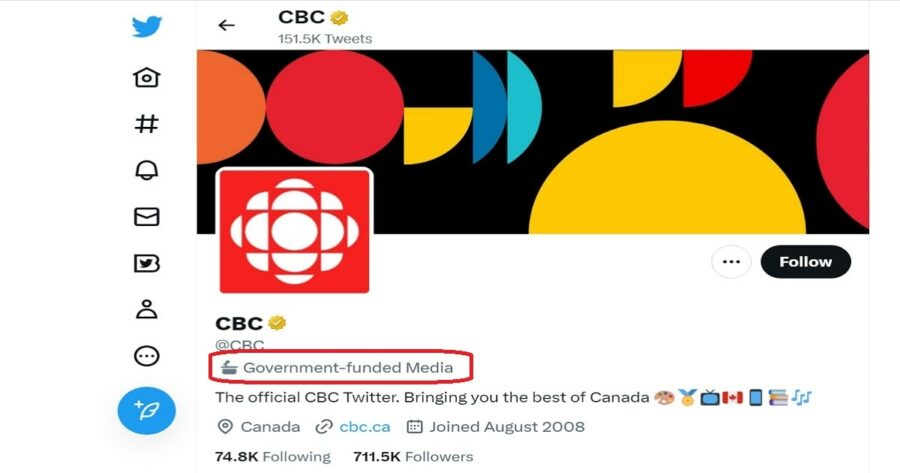The Canadian Broadcasting Corporation (CBC) has decided to suspend its primary Twitter account after the social media platform labelled it “Government Funded Media.” The move comes as part of Twitter’s efforts to increase transparency and accountability for media outlets, particularly those that receive government funding.
For CBC, the decision to suspend its primary Twitter account is significant. As a publicly funded media outlet, CBC has a unique relationship with the Canadian government, and the public closely scrutinizes its coverage of political and social issues.
The label by Twitter has raised questions about the extent to which CBC’s coverage may be influenced by government funding. It has prompted a broader conversation about the role of publicly funded media in the digital age. The move will likely have significant implications for CBC’s social media strategy and its broader relationship with the Canadian government and the public it serves.
Twitter explains how government-funded media accounts are defined as:
“Government-funded media is defined as outlets where the government provides some or all of the outlet’s funding and may have varying degrees of government involvement over editorial content. We may use external sources similar to this one in order to determine when this label is applied.”
Whereas CBC defines it as: CBC/Radio-Canada is publicly funded through a parliamentary appropriation that is voted upon by all Members of Parliament. Its editorial independence is protected in law in the Broadcasting Act.
There is a lot to unpack and a lot of spin and rhetoric about the notion of CBC being government funded as they want to avoid being put in the category of countries they often accuse of being funded by the state.
We must draw a line between government/state-funded media and journalistic independence. At no point did Twitter’s label suggest the CBC’s journalists did not have journalist independence. The label stated a fact, regardless of how the company’s executives want to spin it.
Let’s break down CBC’s well-crafted statement into plain language. In that case, it reads, CBC is funded by the Canadian taxpayers and authorized by the federal government to disburse payments to the Crown Corporation. Each year Members of Parliament vote on how much money the Crown Corporation, an entity owned by the government, will allocate to the organization in its annual budget. CBC has received over 1 Billion dollars a year from the federal government of Canada in recent years, which compliments its additional revenue generated through advertisements.
Since its inception in 1936, the Crown Corporation has received billions of dollars in almost nine decades of being a state-funded news organization.
“The Canadian Broadcasting Corporation (French: Société Radio-Canada), branded as CBC/Radio-Canada, is the Canadian public broadcaster for both radio and television. It is a Crown corporation that receives public funding from the government.” CBC Wiki page
This information has been up for years and has never been disputed, but now because Twitter slaps them with a factual label, it is an issue. For years the public and the Conservative Party of Canada have been calling for the defunding of the Crown Corporation. Poilievre has asserted the Crown Corporation is biased to the left and is not the best use of Taxpayers’ money.
Poliievre has had a contentious issue with the media for his elusiveness, so his assertion of the CBC being biased toward him needs to be taken with a grain of salt. The Crown Corporation could be seen as an unwilling megaphone for amplifying his often subjective points of view. When many Canadians would argue less coverage of the Trumpian type of politician is more left for the American networks.
However, he has legitimate concerns about how much money the Crown Corporation is taking from Canadian taxpayers. For decades the organization has had a hand in shaping the views of Canadians with its stories, articles and interviews. Whether they believe their coverage has influenced elections, such as offering an Existential amount of opinions by its hosts in a nationally televised debate that may sway public opinion or how they covered issues like residential schools, it’s up to the Crown Corporation to reflect on its moral compass.
It is understandable why the CBC is upset by the label, but facts are facts and at no point does the label detract from the good work of some of their journalists. And if the Crown Corporation wants to shed itself from the label as a “Government Funded Media,” the answer is quite simple, stop taking funds from the Federal Government.









